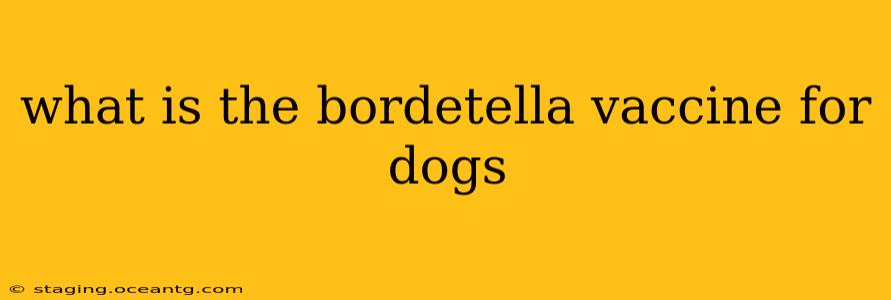Bordetella bronchiseptica is a highly contagious bacterium that causes kennel cough in dogs. Kennel cough, also known as canine infectious tracheobronchitis, is an upper respiratory infection characterized by a harsh, hacking cough. While often mild and self-limiting, it can be severe in puppies, senior dogs, or those with underlying health conditions. This is where the Bordetella vaccine comes in. This vaccine is designed to protect your canine companion from this common and potentially debilitating illness.
What does the Bordetella vaccine protect against?
The Bordetella vaccine primarily protects against Bordetella bronchiseptica, a major cause of kennel cough. However, kennel cough is often a multifactorial disease, meaning it can be caused by a combination of pathogens. While the Bordetella vaccine targets this specific bacteria, it doesn't offer complete protection against all potential causes of kennel cough. Other bacteria and viruses, such as Canine parainfluenza virus, can contribute to the disease. Therefore, a comprehensive approach to canine respiratory health often includes other vaccines and preventative measures.
What are the different types of Bordetella vaccines?
There are two main types of Bordetella vaccines available for dogs:
-
Intranasal (IN): This vaccine is administered directly into the dog's nose. It's generally well-tolerated and mimics a natural infection, stimulating a strong immune response in the nasal passages, where the infection often begins. Side effects are generally mild and infrequent.
-
Injectable (IM): This vaccine is given as an injection, typically under the skin. While effective, it may not provide the same level of protection in the nasal passages as the intranasal vaccine.
How effective is the Bordetella vaccine?
The effectiveness of the Bordetella vaccine varies depending on several factors, including the vaccine type, the dog's immune system, and the presence of other pathogens. While it significantly reduces the risk of contracting Bordetella bronchiseptica, it doesn't guarantee complete protection. It's crucial to remember that even vaccinated dogs can still contract kennel cough, though the symptoms are usually milder and the duration shorter.
Is the Bordetella vaccine safe?
The Bordetella vaccine is generally considered safe and well-tolerated. However, like any vaccine, there's a small risk of mild side effects, such as lethargy, mild fever, or temporary loss of appetite. Severe reactions are rare. Always inform your veterinarian of any pre-existing health conditions your dog has before vaccination.
How often does my dog need the Bordetella vaccine?
The frequency of Bordetella vaccination depends on your dog's lifestyle and risk factors. Dogs in high-risk environments, such as boarding kennels, dog daycares, or dog shows, generally require annual vaccinations. Your veterinarian will be able to advise you on the appropriate vaccination schedule based on your dog's individual needs. They may recommend more frequent vaccination or a different vaccination protocol altogether.
What are the side effects of the Bordetella vaccine?
As mentioned earlier, side effects are generally mild and transient. They may include mild lethargy, sneezing, a runny nose, or a temporary loss of appetite. These usually resolve within a day or two. Serious side effects are rare. Contact your veterinarian immediately if you notice any concerning symptoms after vaccination.
My dog is already sick; can they still get the Bordetella vaccine?
No. Your dog should not receive the Bordetella vaccine if they are currently ill. Vaccination should be postponed until your dog is fully recovered. Contact your veterinarian to discuss the appropriate course of action. They'll assess your dog's health and advise you on when vaccination can be safely administered.
This information is for general knowledge and does not constitute veterinary advice. Always consult with your veterinarian to determine the best vaccination protocol for your dog. They can assess your individual dog's health, lifestyle, and risk factors to create a personalized vaccination plan.
